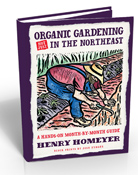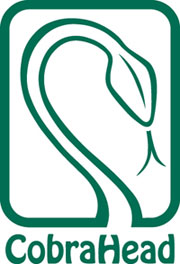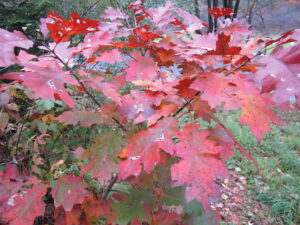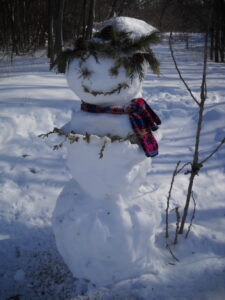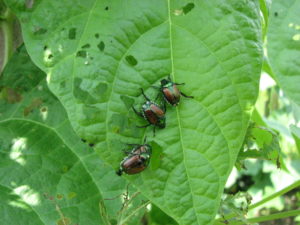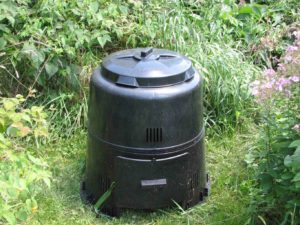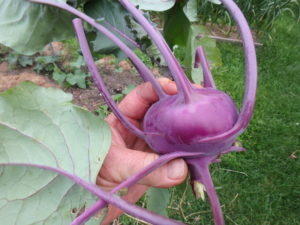Winter Thoughts about Having a Great Garden
This is a good time for all of us to stop and reflect on how we garden. Are we creating lovely-looking spaces, but failing to support pollinators, birds and wildlife? What about the environment? Can we do more? If so, how can we improve? Here are a few of my thoughts.
First, I would recommend that native plants dominate our gardens. I’d say 80% of our plants (or more) should be native, especially trees. Why? Because they do the best, by far, of supporting wildlife – feeding birds and providing food and shelter for animals. Oaks, the best tree of all for wildlife, support nearly 1,000 species of butterflies and moths. But many species of landscape trees and shrubs are from China or Japan, and many only support a handful of species. All plants are not created equal.
I think we all should avoid chemicals in the garden – and not just the vegetable garden. Rachel Carson taught the world that DDT, a powerful insecticide widely used in the 1950’s, was killing off our eagles. But all chemicals used in the garden disrupt natural growth processes – and can adversely affect us, too. Even something as seemingly bland as 10-10-10 fertilizer is only 30% fertilizer – the makeup of the rest is deemed “proprietary information”. So we don’t know what chemicals are used in it. And the salts in fertilizer are lethal to many microorganisms.
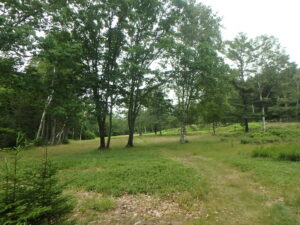
Oaks and birches growing in a meadow can feed pollinators and help birds and can be a substitute for a lawn
Even pesticides that are derived from plants would be banned, if I ran the world. Yes, they are listed for use by organic growers, but many of them are non-specific killers. Both rotenone and pyrethrins are “organic”, but very toxic to bees, others to fish and toads. I guess I would make you pass a test about the pro and cons of any pesticide before you could buy it! Go to https://www.thespruce.com/
Think about the size of your lawn. Does it need to be so big? Could you plant some native trees or shrubs? Once established, trees are very little work. They provide shade and cool the air in summer, and fix carbon in the soil – carbon that otherwise would be contributing to global warming.
7 Resolutions We Can Keep
The holidays have come and gone. Resolutions have been made and broken. Now we New England gardeners are faced with that long, dismal wait before we can start our gardens, and it’s a good time to think about those resolutions we never made: the garden resolutions. If you make – and follow – some of the resolutions below, you’ll not only feel virtuous, you’ll be a better gardener.
Resolution #1. Take the pledge to be an organic gardener. That means using NO CHEMICALS in the garden, no matter how dire the circumstances. Japanese beetles devouring your roses? Get up earlier and handpick them every morning. Weeds in the walkway? No herbicides. Pour boiling water with salt on them, or yank ‘em. Burn them with a blow torch. And forget 10-10-10: no chemical fertilizers, either. There are lots of easy solutions – if you know what to do.
Resolution #2. Read more about organic gardening in this down time before we plant spring seeds. Go to your local library or family-owned bookstore and see what’s available.
Are you a vegetable gardener? Get a copy of Ed Smith’s The Vegetable Gardener’s Bible (Storey Publishing). Ed and his wife, Sylvia live in Vermont and largely live on what they grow. It is well illustrated, and full of fabulous information. They are all, organic, too. This book has stayed in print for 19 years and sold over a million copies.
Another good book to obtain is “Insect, Disease & Weed I.D. Guide” by Cebenko and Martin, Editors (Rodale Press). It came out in 2001, but is still readily available. Organic gardeners have to be a little bit smarter and better educated than chemical gardeners, and this book will not only help you identify pests and diseases, it will offer organic solutions. It’s easy enough to spray a pesticide on a bug, and it will die. But knowing what the bug is, a little about its life cycle, and how to combat it without resorting to chemicals is better.
Resolution #3. Use more compost. Instead of looking for a bagged fertilizer to improve your soil, think long-term. Although bagged organic fertilizers have their place in the scheme of garden things, nothing is better for your soil than compost. Compost is not high in nitrogen, but it introduces beneficial microorganisms to your soil. A teaspoon of compost can contain up to 5 billion bacteria, 20 million filamentous fungi, and a million protozoa. No bagged fertilizer can do that.
Compost also improves the tilth of your soil. Most of us have soil that is either too sandy or too full of
clay. Who do you know that has the “rich, well-drained soil” that every plant book prescribes as the appropriate soil for your favorite plant? We have to make our own soil. We have to nurture it, and improve it until we reach the age of 99, when either it is perfect, or we no longer recognize perfection. Compost helps your soil get there.
Resolution #4. Resolve to mulch more. Mulch will help to smother weeds, add organic matter to the soil as it breaks down, and reduce water loss from evaporation or run-off. Leaves are great anywhere, bark mulch is good in flower beds, and straw, grass clippings and compost are good in the vegetable garden.
Resolution #5. Decide now that you will not let any weeds flower and produce seeds. That means that you have to yank the weed or cut off any seed heads of weeds when you see them – even if you all dressed up and are leaving for the airport. You have to grab the seed heads off that big weed on your way to the car. Stuff it in your pocket, or put it in the trash. But don’t let the weeds spread their seeds.
Resolution #6. Experiment. Every year plant something new, whether a new flavor of tomato or type of zinnia. Try veggies you’ve never grown, and learn to love eating them. Kohlrabi and rutabagas are actually delicious. Try a new type of watering device, or get a new weeding tool (such as the CobraHead, my favorite). Plant a new species of tree, one that flowers.
Resolution #7. And last but not least, resolve to keep gardening fun. Don’t bite off more than you can take care of. Try not to get discouraged if beetles eat your lilies or the phlox gets moldy. Gardening is supposed to be fun – that’s why so many of us do it. Accept that organic gardeners suffer some losses and that no gardener can have success with everything. In the meantime, enjoy the winter, and learn more about organic gardening now – so you’ll be ready come spring.
Henry lives and gardens in Cornish Flat, NH. E-mail him at henry.homeyer@comcast.net.

